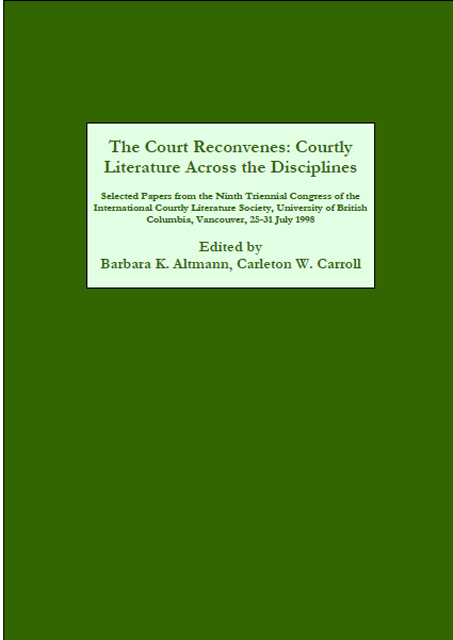 The Court Reconvenes
The Court Reconvenes Published online by Cambridge University Press: 31 March 2023
Von der lieb soliche gedicht
Haben der alten vil gedicht,
Nicht das man darauß bulen lehr,
Sonder und das man sich vil mehr
Mit höchstem fleiß verwar und hüt
Vor der lieb, weil sie also wüt (524,14–19)
Mit diesen Worten beendet Hans Sachs seine Bühnenfassung des Wilhelm von Österreich, eines Romans, der nicht den geringsten Zweifel an der Vorbildlichkeit der Minne seiner Protagonisten lässt, einer Minne, die so stark ist, dass sie in ihrer Idealität sogar den Totschlag am Freund rechtfertigt. Wo Johann von Würzburg die adelige Heiratspolitik als die falsche Liebe von der welt gitsære (W.v.Ö, V.4237) mit Verachtung straft, resümiert Hans Sachs:
Derhalben ist die lieb zu meiden,
Biß das man kumme in die eh,
Denn hab ein lieb, sonst keine meh (524,40–525,3)
Die Sentenz Und spar dien lieb biß in die eh/ Denn hab ein lieb und keine meh ist aus einigen Tragödien und Komödien des Hans Sachs bekannt. Immer wieder propagiert er die der Zunftordnung und der göttlichen Ordnung entsprechende eheliche Liebe gegenüber der höfischen Minne. Hierzu arbeitet er eine Anzahl von höfischen Romanen für die Meistersängerbühne um. Als Vorlage bedient er sich in der Regel der Prosadrucke nachklassischer oder nicht-arthurischer Romane, die in ihrer Struktur weit formbarer sind als die klassischen Artusromane.
Besondere Beachtung verdienen im gegebenen Kontext die Dramatisierungen von Flore und Blanscheflur (1551), von Tristrant (1553), Wilhelm von Österreich (1556), Pontus und Sidonia (1558) und Willehalm von Orlens (1559). In diesen Texten geht es um voreheliche Liebesverhältnisse oder, um bei der höfischen Terminologie zu bleiben, um stæte triuwe, die gesellschaftlichen Hindernissen begegnet. Hans Sachs ist in der Forschung wiederholt vorgeworfen worden, dass er seinen Vorlagen sklavisch folge, dass er zwar kürze, aber nicht sinnvoll verändernd eingreife, dass er die Handlung willkürlich auf eine beliebige Anzahl von Akten verteile und schließlich im Epilog den „Dramen” eine Moral aufsetze, die nicht aus der Handlung entwickelt sei. Dies würde bedeuten, dass die Handlung weiterhin stæte triuwe vorführe, sie nur hinterher von Sachs als unerlaubte voreheliche Liebe verurteilt werde.
Die genannten fünf Dramatisierungen höfischer Minneromane sind sehr unterschiedlich, doch auf keine trifft dieses Verdikt zu. Sie folgen zwar nicht den formalen Vorschriften des klassisch antiken Dramas – es handelt sich um Sieben-Akter–, die Akteinteilung ist aber bewusst gesetzt und mit dem Handlungsund Spannungsverlauf korreliert.
To save this book to your Kindle, first ensure [email protected] is added to your Approved Personal Document E-mail List under your Personal Document Settings on the Manage Your Content and Devices page of your Amazon account. Then enter the ‘name’ part of your Kindle email address below. Find out more about saving to your Kindle.
Note you can select to save to either the @free.kindle.com or @kindle.com variations. ‘@free.kindle.com’ emails are free but can only be saved to your device when it is connected to wi-fi. ‘@kindle.com’ emails can be delivered even when you are not connected to wi-fi, but note that service fees apply.
Find out more about the Kindle Personal Document Service.
To save content items to your account, please confirm that you agree to abide by our usage policies. If this is the first time you use this feature, you will be asked to authorise Cambridge Core to connect with your account. Find out more about saving content to Dropbox.
To save content items to your account, please confirm that you agree to abide by our usage policies. If this is the first time you use this feature, you will be asked to authorise Cambridge Core to connect with your account. Find out more about saving content to Google Drive.